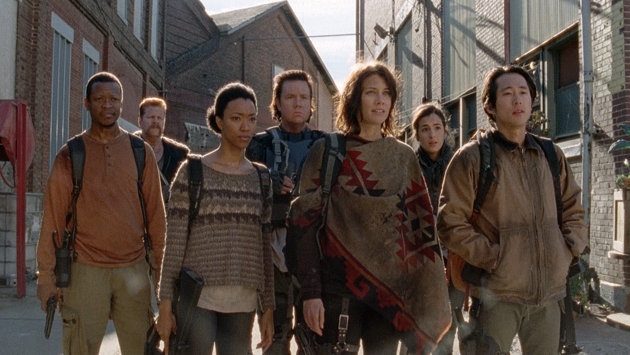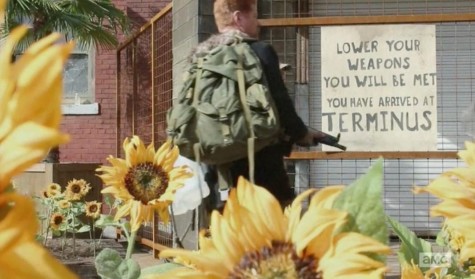Fleshing Out The Feel Of The Walking Dead
July 21, 2014
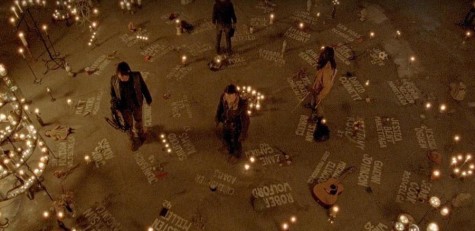 Sure, we’ve seen it all – from flesh eaters, to cannibals, to the living dead. But nothing says stop and stare like the jaw dropping season four’s finale of Frank Darabont’s AMC series, The Walking Dead, sure to give even George Romero a run for his money.
Sure, we’ve seen it all – from flesh eaters, to cannibals, to the living dead. But nothing says stop and stare like the jaw dropping season four’s finale of Frank Darabont’s AMC series, The Walking Dead, sure to give even George Romero a run for his money.
Admittedly, there was a favored formula for season 4 with the usual waiting walkers, an addition of some creep show cluster of rabble-rousers patiently on prowl, the continued trip to (tainted, or so it seems) Terminus and the character conflictions along the way. But that was simply dangling the bait, for in the first fifteen minutes we see the now-not-so-subtle subplot of the show -monsters are what you make of them, as Rick,(our farmer or fighter, depending on scenario) goes from being fresh meat to not on the menu with his chow down, neck-nipping scene.
Although some may have seen the second half of the season as slow paced, a scene such as this sets the stage for the significance behind the nail-biting series itself. It’s like that old saying: don’t fear the dead, but the living for they are the only ones who can hurt you.
The series, with the start of the first season depicts the dead as a threat that can be outrun and/or hidden from. It has also devised a plan to “treat” those that suffer from immediate infectivity by the severing off the limb infected. But seemingly enough, throughout season after season, it isn’t so much the dead that make a mess out of morality, but the people still left alive that demolish anything sort of sanctuary.
For instance, the first season’s finale, TS-19, leads with the group (Rick, Carl and Daryl, among a few others), finding refuge in a center for disease control and prevention only to come to terms with the fact human civilization ceases to exist and Dr. Jenner is generously offering an instant and painless death to all those inside. It ends with Rick pleading to let them all at least “try” to overcome this tragedy despite the thought that everyone with a lingering pulse is already plagued by the disease and that they, are the walking dead. Season two ends on a similar note as well, as soon as sanctuary is formed or in this case, found at Hershel’s farm, the group once again is forced to flee thanks to human heroism in the form of trying to spare the dead in hopes of a coming cure.
Season three’s finale is when the gnawing subplot comes into play, hitting hard with the unfortunate facts as the Governor proclaims, “in this life now, you kill or you die. Or you die and you kill,” before ambushing the prison which has now become sanctuary for season one and two’s survivors. That season ends with Sheriff Rick playing savior to those left over from the surviving assault team and those still residing ‘safely’ behind the walls of Woodbury, all the while with the Governor and his tag team still at large. Which, subsequently, leads into the fourth season’s midseason finale with the capture of two of our main character’s Hershel and Michonne, who are used as pawns in the Governor’s plans to reclaim his sickly sought after retribution. Rick, with shredded sanity pleads that they all, aren’t too far-gone to coexist peacefully, echoing Hershel’s former plan of action.
This midseason finale and the ones prior play on the fundamental plot of The Walking Dead; living is what makes monsters of men. This episode, “Too Far Gone” ends with the casualty of the Governor, his hostage Hershel and several other survivors and we are left with Rick’s solemn statement to his son, “don’t look back, Carl.” Which, of course is a read between the lines to all us viewers that they, and us, have reached the point of no return.
That said, after three and a half seasons fully focused all on action, sure the second half of the fourth season is a tad bit slow, but all for reasonable rationale. It is as
Rick states to his son with weighted words, “we’re gonna tell them who we are,” and Carl’s counterclaim, “but how do you say that, I mean, who are we?” The Walking Dead series, unlike zombie fan favorites before it, isn’t just a show about the dead walking. Instead, it showcases the story from a completely different standpoint, which simply is, what sort of horror show will man become when civilization ceases to exist and there is no sane society to conform to.
This taunting theme resurfaces time and time again throughout the finale, only starting with Rick’s teeth tearing into Joe’s (a cut throat, seeking solace in an eye for an eye) throat. The episode delves in to the depths of piecing together the parts of lives once lived by the other cast off characters, such as Michonne with the (about time) spilling of her story to a, what seems to be, horrified Carl all in mere means of reassurance to Rick’s (thankfully) throat-tearing turn of events. Though Carl’s commentary, “He told me the other day that he was proud of me, that I was a good man, I’m not. I know more now, about what he wanted from me, and I tried, but I still have these thoughts. I’m not what he thinks I am. I’m just another monster,” compliments the conflicting spotlight of the show and showcases the spectrum of what’s waiting for us in store in season five.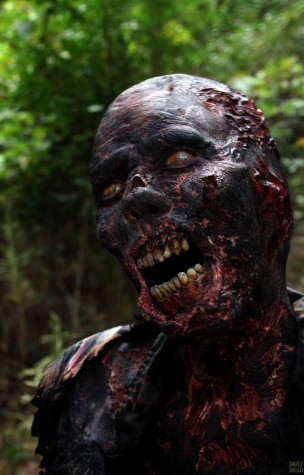
Rick’s final quote of the finale faces the facts, that TheWalking Dead, up to this point has been played out passively, with foreshadowing before each bend in the road. The current characters have been set in stone, so to speak, with the repetition of flaws, acts of humane heroism, or the transformation of saint to sinner. Now, with our gallant group of steadfast survivors once again with their backs against the wall in a Terminus boxcar, and Rick’s conclusion, “they’re screwing with the wrong people,” there’s no telling what inducing gasp welcomingly awaits us.
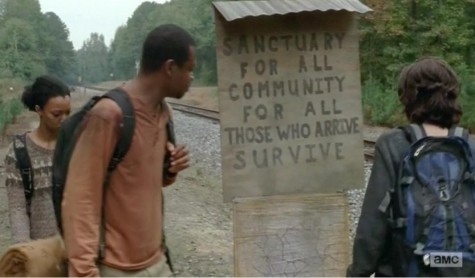 The series, in itself, depicts man, (the fully fleshed, warm blooded type) as the modern monster. A subtle statement that should, undoubtedly scare us into shock with the plausible possibility behind such a suggestion. So, what better way to end the season than dip our toes into a little character building before the fifth season breaks down our waiting walls of what-ifs and shreds our silky sense of morality some more.
The series, in itself, depicts man, (the fully fleshed, warm blooded type) as the modern monster. A subtle statement that should, undoubtedly scare us into shock with the plausible possibility behind such a suggestion. So, what better way to end the season than dip our toes into a little character building before the fifth season breaks down our waiting walls of what-ifs and shreds our silky sense of morality some more.
Season four’s finale, “A” leaves us with words of wisdom for what’s to come calling in the following season. My guess, “A” not-so-subtly stands for anything goes, promising a fifth season surely worth sinking your teeth into.



